#It's like the parable of the prodigal son
Text


I know this is a little sacrilegious but I think my Lord and Saviour can take a joke.
#Dracula Daily#Christianity#Sputton#Christian Memes#Jonathan's earned a little sacrilegion#Don't get me wrong Jesus is more important#But#It's like the parable of the prodigal son#My blorbo was lost but now he is found
42 notes
·
View notes
Text


two b-list sons of God and a second-rate resurrection
#tlt#my art#tower princes here pictured shortly after having chopped up a bunch of devil-infested civilians at antioch and burning the bits#which is a thing they did! crazy.#like...between htn and ntn ianthe and kiriona were just. bonding over committing war crimes in the name of imperialism i guess!#i think ppl forget sometimes that they weren't JUST on the mithraeum they were actually at antioch. idk how much they were actually on#the front lines but they were THERE roughing it in the military encampment or w/e. and gideon seemed to have#pretty firsthand knowledge of the devils and their specific disposal methods so. yeah i think she was doing some chopping and burning.#anyway the text in image 1 is the parable of the prodigal son#and image 2 is luke 9:22 (jesus foretells his death) and mark 16:6 (the resurrection)#imagine you practice ninth house religion and your iconography looks like this.
2K notes
·
View notes
Text
adventures in christian opinions about judaism
(reposted from Twitter)
So a while back I started writing a thing on the trio of parables that ends with the prodigal son (which I still need to finish) and like MAN OH MAN do Christian commentators insist that Jews hate shepherds.
Like, I can't even count the number of commentaries that insist that shepherds were "despised figures" for first-century Jews and the parables of the lost sheep and lost coin were designed to insult the Pharisees by comparing them first to a shepherd and then to a woman.
So, as is my wont whenever Christian commentators make a claim about what was normal for first-century Judaism, I decided to try to hunt down their source on this.
As I've said many times, when it comes to Christian parable interpreters' claims about what attitudes/beliefs/etc. were normal for first-century Jews, get used to the phrase "no sources are cited."
I mean, first off, as a 21st-century Jew, the insistence that 1st-century Jews hated shepherds rings odd, given that <checks notes> Abraham, Isaac, Jacob, Rachel, all of Jacob's kids (the founders of the tribes), David, etc. were all sheep-tenders. The image of God as a shepherd is pretty consistent throughout the Tanakh. That image reappears in the Qumran texts, which as far as I know, are one of the few Jewish sources we have from 1st-century Judaea.
The term "despised" gets used a lot, so I decided to dig into that one.




When I was able to find citations, I traced them back to an 1882 commentary by a guy named Frederic Farrar.
Farrar cites Heinrich Meyer as a source for this, but when I looked up THAT citation, it's Meyer saying that shepherds were a "lowly but patriarchally consecrated class" -- in other words, poor, but with a distinguished history and status.
So that's why everyone's tossing the term "despised" around--because Farrar just made it up. But what about primary sources? I went back on the hunt.
Surprisingly, in a number of reference works, like glossaries and Jeffers's "Greco-Roman World of the New Testament," I found similar assertions about the common attitude toward shepherds, for which they cited...
<drum roll>
Aristotle. You know, the Greek guy who lived 300 years before Jesus? Definitely a reliable source for Jewish attitudes of the time.
Some people cited Philo's On Agriculture. Okay, Philo was at least Jewish and lived when Jesus would have, although he was a wealthy Hellenized Jew living in Alexandria rather than a Pharisee living in the Galilee. But okay, at least it's the right culture and time period. (The reference in Philo turns out to be talking about the section of Genesis in which Joseph's brothers come visit him in Egypt. It talks about how they were proud to be shepherds, and criticizes (gentile) kings who look down on shepherds.)
Then we've got Mishnah Kiddushin, in which a bunch of rabbis are having a debate about which professions make you trustworthy vs untrustworthy, and one rabbi lists everyone from camel-drivers to herders to barbers to shopkeepers as untrustworthy. Another rabbi comes back and is like, nah, all those people are fine upstanding folks; it's doctors and butchers you've gotta watch out for. So they're citing one cranky dude with a LONG list of people he doesn't like, who immediately gets shot down, as evidence of the normative attitude for Jews about a century earlier.
Oh, and we've got a citation of Midrash Tehillim which says that God-as-shepherd doesn't have any of the failings of humans-as-shepherds, which... sure. Also, it was codified in the 1300s?
The most compelling citation is from the Talmud (Sanhedrin 25b), in which the rabbis discuss who's qualified to be a legal witness. They exclude shepherds, because shepherds graze their animals on other people's land, which some of the rabbis see as a type of theft.
The Talmud is a record of debates, but this passage definitely makes it sound like this is a majority opinion. (It should be noted that the passage disqualifies all KINDS of people, from those who lend with interest to those who fly pigeons, as having conflicts of interest.)
But the important thing here is that the Talmud includes records of debates from as late as the 4th or 5th centuries CE (300-400 years after Jesus's time), and the passage makes a point of noting that the disqualification of shepherds as witnesses is a later development.
So in other words, the idea that the Pharisees hated shepherds and would have been insulted by Jesus telling a story in which the protagonist was a shepherd is based either on Greek attitudes that are 300 years too early or Jewish ones that are 300-400 years too late.
But people will twist themselves into citation knots (or just not bother citing a source at all) to insist that this was a common attitude so they can position the Pharisees as hating those charming humble shepherds and their fuzzy little lambs.
As to WHY this idea seems to be so important to them, well, you cannot read about Luke 15 without encountering the word "outcast" roughly 90 times per page.
The framing is Jesus was friend to The Outcasts while the Pharisees despised The Outcasts and the Lost Sheep, Coin, and Sons are all parables about accepting The Outcast.
Never mind that neither the sheep, the coin, nor either of the sons got kicked out of their communities. The sheep wandered off, as sheep are wont to do, the coin was lost by its owner, and the younger son decided to leave to go on a spending spree while the older son declined to attend the welcome back party for him after his dad managed to hire a band and caterers but never thought to let his own son know what was going on and he had to find out from a hired hand.
Moreover, the term "outcasts" gets used as a synonym for "tax collectors and sinners." Tax collectors were usually pretty well-off because they ran a protection racket for the Romans. Outcasts? I mean, I guess? But hardly in the "marginalized and powerless" sense.
As far as "sinners," the NT doesn't usually bother telling us what, exactly, they did to "sin," but on the rare occasions when it does offer that context, it's almost always wealthy people.
But why talk about that when they can present the objection the Pharisees had to Jesus's dining with "tax collectors and sinners" as the Pharisees despising lowly outcasts, and insist that the Pharisees hated the idea of such people repenting and returning, and so Jesus was tweaking their noses by comparing them to shepherds and women.
As if, you know, teshuvah wasn't something the Pharisees were ALL ABOUT. If you want to actually understand, consider that the iconic tax collector in the parable of the Pharisee and the tax collector shows no inclination to STOP being a tax collector.
The objection wasn't you're having a friendly dinner with poor lowly outcasts for whom we have contempt. It was you're having a friendly dinner with people who are extorting their neighbors on behalf of the invaders who kill us for looking at them funny and have expressed no intention to stop doing that.
Now, there's a good discussion to be had about whether shunning Trump lawyers and Marjorie Taylor-Greene donors or inviting them to dinner and trying to win them over with compassion is more effective, more ethical, more compassionate (to whom?), etc.
But presumably we can see why people of intelligence and goodwill might disagree on which of those approaches is the right thing to do, and why such people might might object to the strategy they don't agree with.
But what really gets me is that Christians have the utter fucking NERVE to paint the Pharisees as inhumanly awful for not wanting to have dinner with tax collectors while viewing Corinthians as Holy Writ:

I mean, Paul's all YOU MUST SHUN ALCOHOLICS AND PEOPLE WHO ARE GREEDY and Christians are like yes, that makes sense, but if the Pharisees are like, no, I don't want to have dinner with that guy who narced on my cousin and got him crucified, Christians are like, they're monsters.
Cool, cool.
Anyway, this has been your weekly edition of Christians Need To Stop Just Making Shit Up About Jews And Then Citing Each Other Like It's Fact.
And there were a lot of "I've never heard anyone say Jews of Jesus's time hated shepherds..." responses: Maybe you haven't, but that doesn't make it uncommon.
Sources in which I've found it:
Craig Blomberg (Denver Seminary, Society of Biblical Literature, Tyndale House, NIV translation committee)
Jared Wilson (professor at multiple Baptist seminaries)
Stephen Wright (Spurgeon College (British evangelical college))
Arland Hultgren (Luther Seminary (ELCA))
Kenneth Bailey (Presbyterian/Episcopalian)
Joachim Jeremias (Lutheran, cited EVERYWHERE)
Bernard Brandon Scott (Disciples of Christ, the Jesus Seminar)
Klyne Snodgrass (Evangelical Covenant Church)
Barbara Reid (Catholic Biblical Association)
That particular trope spans denominations, decades, etc. It's not a fringe viewpoint.
#christian exegesis#antisemitism#jumblr#citational politics#bad methodology#parables#pharisees#first century judaism#second temple judaism#good shepherd#prodigal son#why are christians like this?
366 notes
·
View notes
Text







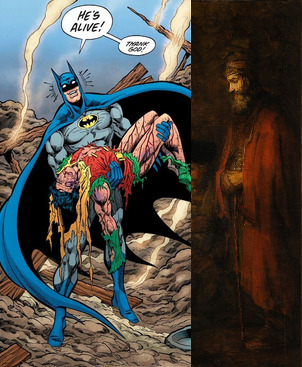

Is this anything?
Luke 15:11/New Teen Titans vol 2 #31/Luke 15:27/New Teen Titans #55/Luke 15:28/Detective Comics vol 1 #38/Everything or Nothing, Willyecho/Batman Annual #25/Return of the Prodigal Son, Rembrandt/Luke 15:32
#dick grayson#Jason Todd#i just think about them and the parable of the prodigal son a lot#there's symbolism in there story somewhere but I'm not sure I'm smart enough to draw it out#right now i feel like I've created a conspiracy theory board minus the red string#maybe I'll make a more comprehensive post in the morning#I'm generally more with it then
191 notes
·
View notes
Note
can you explain the biblical allusions in succession? kendall's attempt to cleanse/baptize himself in bathtubs, him essentially being the plastic jesus to logan's god

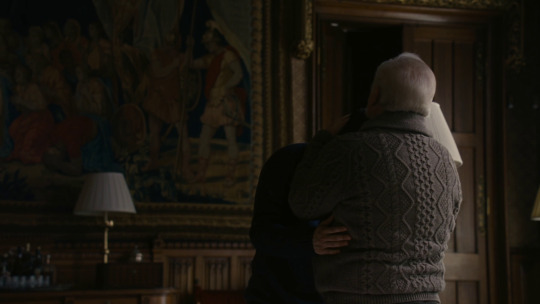






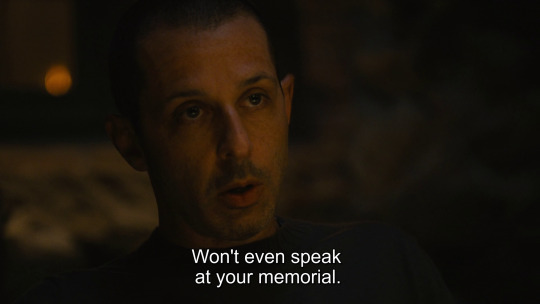








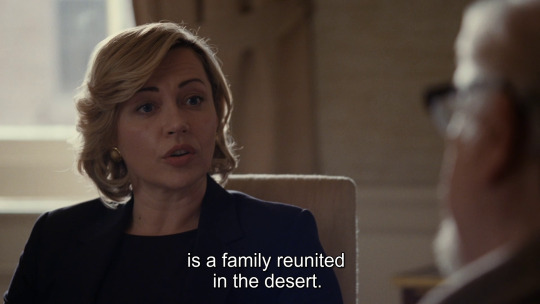






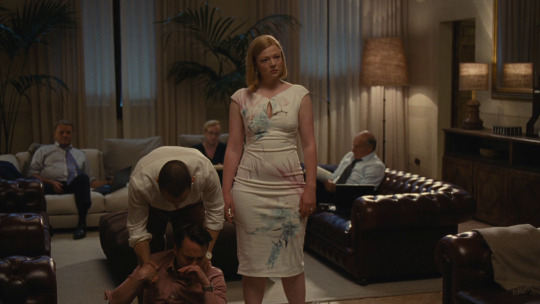

#oh it's been so long since you sent this anon#i'm sorry it's taken me so long to reply#and this is barely even a reply haha#it's more just like - -#it's a massive question!#i think there are soooo many biblical references#but the show does play it fast and loose#you are raising my catholic nonna in my brain though haha#the story of ishmael and isaac was a lowkey fave of hers#but yeah i do think that and the parable of the prodigal son are probably the most relevant stories#although of course the water motif with kendall is Huge#welcome to my ama#hbo succession#succession meta
32 notes
·
View notes
Text
look i hate christian hegemony as much as the next queer but you need to understand that stuff you learned in supernatural and good omens is not actually theology.
#anime life#christianity has so many problems. why make some up to complain about??#'christianity teaches you that sin is inescapable' it literally doesnt????#like. the whole point of the religion is that you WILL sin (because you are human) but your sins can be forgiven#and you can always come back. like. the parable of the prodigal son??? the shepherd and the lost lamb???#'why are there fallen angels but no risen demons???????? checkmate christians'#a risen demon would just.#be an angel.......#if you break up with your boyfriend. hes your ex boyfriend#if you get back together. hes not your ex ex boyfriend??? hes just your boyfriend again???
7 notes
·
View notes
Text
Not to be a biblical parallel enjoyer but you know who else renly and stannis remind me of? The Prodigal Son and his Brother ‼️
#i used to haaaateeee that parable as a kid#i would get so angry on the brothers behalf like YEAH WHY ARE WE FORGIVING THE PRODIGAL SON
1 note
·
View note
Photo
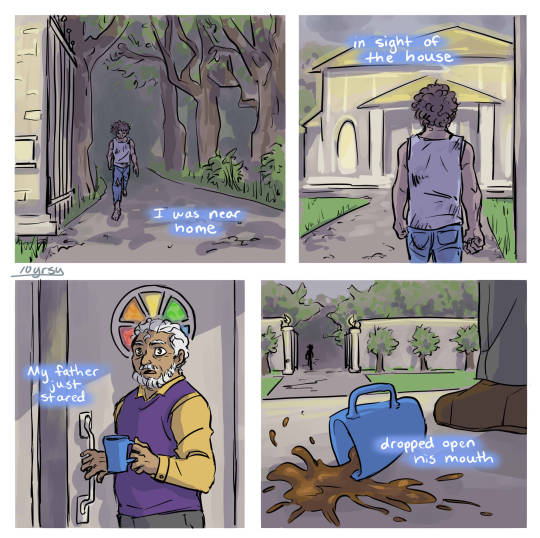
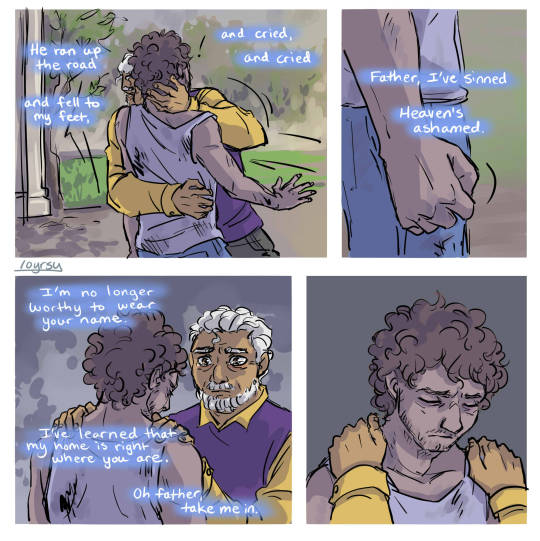
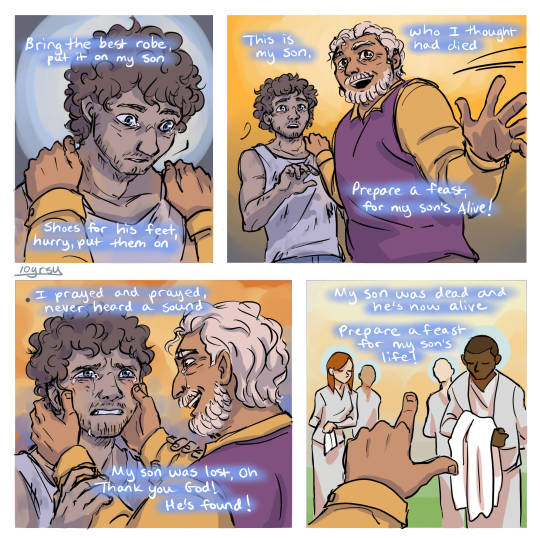
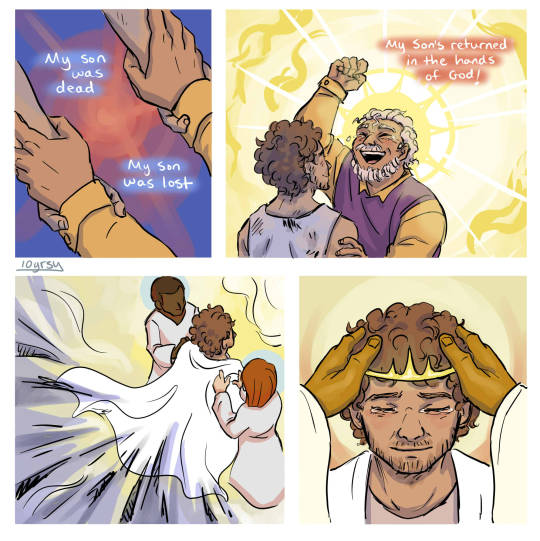
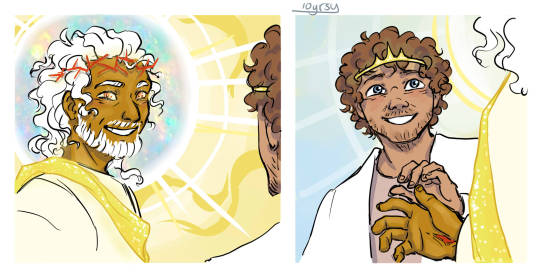
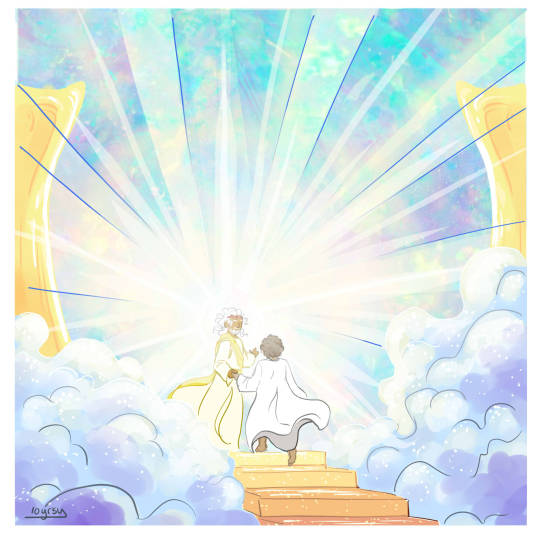
youtube
possibly my favorite song of all time, “The Prodigal Son Suite” by Keith Green, tells the parable of the same name in Luke 15:11-32.
a man asked for his inheritance from his father before he’d even passed and then goes off to waste it all on worldly fun and fast friends. but when he runs out, he hits hard times and in his struggle, realizes his mistakes. he heads back home, hoping he will at least be allowed to work as a servant for his father. upon his arrival, his father rushes to meet him and the son confesses his sins and regrets. but the father is overjoyed to see him; he’s already forgiven him and throws a huge feast to celebrate his return to the family.
this parable is a beautiful picture of salvation and the heart of God the Father. the son didn’t deserve the celebration; he wronged his father and turned away from him. but the father still loved him and was ready and waiting to receive him back. the reconciliation only happened once the son acknowledged his mistakes and made the choice to return.
every one of us has sinned against God. and yet He still sent Jesus to die for us and pay for that sin in our place. He waits eagerly for us to repent (which means a change of mind) and turn to Him. His eternal gift of salvation is a gift of Grace, meaning it’s something we didn’t and can’t earn. like the father, Jesus waits with open arms to forgive us and receive us into His Heavenly family. and as Luke 15:7 says, “There is more joy in Heaven over one lost sinner who repents and returns to God, than over ninety-nine others who are righteous and haven’t strayed away!”
“We are made right with God by placing our faith in Jesus Christ. And this is true for everyone who believes, no matter who we are. For everyone has sinned; we all fall short of God’s glorious standard. Yet God, with undeserved kindness, declares we are righteous. He did this through Christ Jesus when He freed us from the penalty of sins.” (Romans 3:22-24)
(even greater than my love for the parable, is my love for the beginning and ending segments of music. it sounds so much like a Heavenly Homecoming to me, that i tried my best to incorporate that feeling into the ending.)
#christianity#Jesus Christ#God#the bible#Bible Verses#faithstuff#faith#salvation#the prodigal son#keith green#heaven#religion#religious art#song comic#song art#my art#angels
443 notes
·
View notes
Text
Until The End Of The Night | Ch 2



-1 am.-
✦ College!au, characters in early twenties, support!reader, slight angst to happy ending
✦ Synopsis: after over three years abroad you come back to continue your education. Despite gaining new friends and living a great life in Europe nothing feels better than home. You are quickly sucked in the everyday drama and everything would be just as you left it if not for Bakugo. Three years ago you two shared a moment, a short and meaningful moment that no one knows or should know about. That is until the situation gets out of control.
✦ Warnings: smut
✦ Word count: 2k
✦ Chapter: Hot pot place, homecoming party and a bitter taste to it. You were wrong all the way.
Masterlist



You made some mistakes that night at the hot pot place, five to be exact. Five crushing mistakes that left you punching your pillow at one o’clock. The first of them was thinking about Bakugo Katsuki.
The blonde slipped into your thoughts like a murderer slips around the corner after you sent your midterm report and some other documents back home. The sharp edged blade of excitement pointed straight at you. Elusive memories of the bonfire night bounced in and out of your brain when you sealed the paper boxes with sticky tape, readying your belongings for the long journey.
You were not that self-centred, you also thought about others but it was easier to ground them in your head, as they flooded your phone with messages. Mina has been jumping around like a flea on a dog’s butt ever since she learned you were coming back. She was rambling about doing college stuff together (as if you ever believed she was actually studying and not only barely passing), going to parties and clubs, having sleepovers like you used to and so on. Denki was not that nostalgic but he kept sending you thousands of memes and photos of himself like the one on the couch with an empty space next to him and a title ‘waiting for you baby girl’. He even once sent you the whole of the Parable of the Prodigal Son, pasted into a text message. Kiri asked if you need help moving something heavy from the truck.
Bakugo never texted, not even once in nearly three years. He was a man of his words, disappearing just as he promised you he would. You were not angry nor sad, you hardly sported any emotions for him right now, or at least up to that point.
After the feral night you got caught up in college, moving, new country and all that stuff and it came out that you never texted, neither did he, so you’ve done as he asked you and pushed the feelings to the side, soon not even bothering. Very soon.
Up to today you didn’t understand his motives but the thought of seeing him and saying ‘hi’ lit up a warm feeling in the pitch of your stomach. What will the mysterious Bakugo say to you? Guess you’ll have to wait and see.
Your second mistake was looking Bakugo Katsuki in the eye as he entered the hot pot place.
Just after you unpacked your last shirt and folded it neatly into your closet, that would sooner than later become a familiar mess again, you found yourself in a spot that Mina and Denki promised to be good. It was to have delicious hot pots and fairly cheap beer. That was the place where you found yourself, celebrating the big homecoming. It was just the closest pack, with Kirishima as a plus one to Mina. Oh how happy you were they finally got together last year, after all that blind man’s buff. And just as always Bakugo was on Kiri’s track to social gatherings.
When he came in, catching you all in the line, just as you were about to be guided to your table, he threw you a nasty look and that’s it. It was as if he saw an old chewing gum at the opposite end of a park bench and was grateful that he didn’t sit on it. Nothing changed here, you guessed.
The third mistake was letting Denki arrange the seats by forcefully pushing himself flat against your side. Mina took the seat on your left and Kirishima, like the retriever he is, politely sat in front of her. This left Bakugo with only one option which was opposite of you. That way you had the perfect, front row seat to the ice-themed show he put up all night.
The food was delicious, the beer indeed cheap and your friends all around. No matter how many people passed through your life abroad, nothing felt as good as back home, in the warm embrace of known and loved. Hours flew by with photos, memories, achievements, second-hand embarrassment from Denki’s stories about his flirts, and stuffing your stomach to the point of bursting. The place was alive that night with laughter echoing not only from your table. People’s heads moved and bounced, bobbed and sank all around the tight place like troubled sea, swelling with stories, shouted out over chunks of beef and pork.
All was warm, fizzy and tipsy aside from the blonde. The air seemed to freeze for a split second every time you caught sight of him. His eyes were piercing, the red around his pupils insufferably cold. He seemed to suck that cold air out of the hot pot place, up to the point of suffocating everyone just to prove something to you. This tension broke and vanished as soon as he looked away, answering Kiri or throwing curses at Denki. No one else noticed, no one else around your table was his target tonight.
Your fourth mistake was stopping by the open sliding door when you spotted him also coming back from the toilet. Why did you have to finish washing your hands at the same time? The cool air of a spring night kissed your exposed cheek, barging in the door that some staff member left open, mindlessly. Maybe if not that door, the strip of city at night patched onto the steady fibre of the restaurant wall, would you never ever hear what his lips told you.
“Well hello there stubborn ass.” You cracked a smile hoping now, when you were alone would he finally stop with his act.
“The fuck you want?” In an instant his arms were crossed, delineating a firm border. His frontier was barricaded, ready for offence any moment.
“I was just amused with how you were able to not even greet me despite sitting here for a few hours already.” The smile, still plastered on your face, started to feel stiff.
“And?”
“And?” Your patience was running surprisingly short with this man. There was no logic in fighting with him right now. Heck, you never fought with him, so why are you feeling so defensive right now? “I just wanted to ask whether something happened, you’re acting a bit weird.”
You tried to be as nice as you could despite harsher words pushing at your lips. All of his nasty stares, huffs and ignorance this night could hardly be named ‘acting a bit weird’.
“You’re imagining things.” His stance was high and mighty, too high for you it seemed.
“No I’m not. Something’s off and if you’re feeling that bad then why did you even come here in the first place? The night was supposed to be about my coming back, you knew it.” You hated when someone told you you were wrong when you clearly weren’t, especially if it came from a place of nonchalance.
“I think you’re giving yourself too much credit. It’s not about you.”
“Then why did you come here with this mood?” Saying that you pointed up and down his angry form.
“I’m fine.”
As much as you didn’t want to, an irritated huff escaped your lips. How can he lie so obviously? “If you say so.” Not seeing a point in pressing more of his buttons you decided to surrender.
“Yes, I do say so.” Chewing the inside of your cheek at how he always had to have the last word, you were just about to turn the corridor to safely sail to the bay between Mina and Denki, leaving this storm at sea. “You really think you’re that important, huh?”
An irritated look passed through your features.
“And what does that mean exactly?” Let all hell loose, he won’t be talking to you like that.
“What you’ve heard. You think this is all about you while it’s not.”
“You came to my homecoming party with a nasty face, been salty all night long ignoring me and not even greeting me after three years and you say it’s not about me? What’s the problem then, the hot pot too hot and it ruined your mood?” Your earlier words were quick like bowshots but now he was taking his time, loading the siege weapon. “If it’s about the night at the bonfire then…” You tossed your arms into the air aimlessly. “Then tell me. I come back and I miss the point, I don’t know what’s happening. If you’re scared I will tell someone, tell Mina or anyone I won’t. Never did and never will, so just stop pretending.”
His lips laughed, a short, dry and breathy laugh but his eyes stayed put, piercing you like arrows.
“You were always sharp weren’t you? Smartass. Okay, it is about you.” Bakugo came closer, standing chest to chest with you, not minding to bend down to your level. He was too comfortable up high. “Remember that because I’ll only tell you once. I don’t want any extras in my life and that includes you. I’m pissed that such a nobody can come back and shimmy her way into the lives of people who won’t profit on it. You’re just so, so selfish.”
Your way back to the table was long and dizzy. The air changed and the commotion that met you in the main room after lingering in the tight corridors of the restaurant maze made the paprika, soy sauce and bitterness come up your throat. He was not here anymore, he went home when you were in the toilet. He didn’t even say goodbye, what a prick, Denki said.
Yes, he was a prick.
The pillow was bashed in on one side as you punched it a few times in hope of letting out some steam, or more like building up some. You wanted to be angry, you wanted to be furious. You could grab your phone and text Bakugo how stupid, childish and selfish he acted. You would be the bigger person because you are still keeping the secret, despite him starting an open war with you. But you didn’t, you weren’t angry. Sadness choked your throat and you pillow-punches were weak.
You hoped that Bakugo would keep the secret because now it felt like a stigma. A burning brand every place his hands roamed three years ago.
You’re just so, so selfish.
You had too much bravado in yourself. The bonfire night lost its pink hue and turned to real colours. Did you even remember it right? You were drunk, he was drunk. Was it the first time a boy told a girl anything she wanted to hear to get in her pants? Did he even ask you about the whole girlfriend stuff or did you dream it later? Write another chapter to this story, an unsuccessful, pretended epilogue because you desperately wanted to be the main character?
All this time you held some sort of a sick pride to the fact he had a thing for you. Sure, it was sad you learned about it a few days before your departure but was it not a confidence boost, to have someone like Bakugo crushing on you and fucking with you? You felt as if that memory was a foundation to a part of your character. And now that pillar was ruined. What came in its place was embarrassment.
Just as he said three years ago, Bakugo popped up behind Denki in video calls or in the periphery of Kiri’s gym photo sometimes. You saw how he looked, how he grew. If he was considered handsome in highschool then college was out of line. Ranking climbing, challenge addicted, good-looking and surely heartbreaking. The audacity of yours, thinking of him as your score. You were his score, an easy start, a quick nothing.
The fifth and final mistake of yours was reading too much into what was, in fact, very simple.



You want to be in a Taglist? DM me or leave a comment.
Taglist: @rayleeya @chocoyanchan @the-dumpster-fire-of-life @sofilsword @bri-mercado-00
#katsuki bakugo x reader#bakugou x reader#mha#bakugo#bakugou#katsuki bakugou#katsuki x reader#bakugou katsuki#bakugo x reader#katsuki bakugo#Until The End Of The Night#bakugo x you#bakugo x y/n#bakugo smut#bakugo katsuki#kacchan#mha bakugou#mha x reader#boku no hero academia#my hero academia
76 notes
·
View notes
Text
Friendly reminder that Venti is called the prodigal son in his drip marketing. Because oh god the implications are insane if you remember that.

The prodigal son.
The FUCKING prodigal son. Aka the christian parable in which a drunk son runs away from his family, spends all their money and eventually goes back and apologizes and IS TAKEN BACK IN BY THE PARENT.
Like... What does that mean Venti??!! What did you do?
(Also can we talk about how much christan symbolism Venti has? Because he's got a full church, crosses are apparently a symbol since, you know, Barbara wears them? (Why are crosses even part of his symbolism? Do they believe he was crucified? Like, in canon. Why?)
Either way, the symbolism is much deeper than most people aknowledge it being so... yeah... that's pretty weird.)
#the parent is probably istaroth the celestial goddess of time#but we can't be 1000% sure#either way this shit is weird#what did you do to piss of istaroth Venti?#what did you do?????#venti#barbatos#istaroth#textpost
301 notes
·
View notes
Text
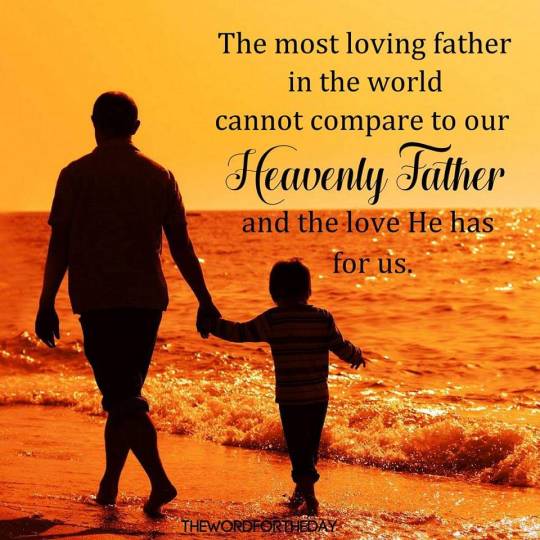
Jesus told a story that gives us a glimpse of God’s heart for us. In the parable of the Prodigal Son, the son goes his own way and squanders his inheritance. When his life fell apart, the son realized his folly and returned home. What was the Father's response? It wasn’t “I told you so!” Rather, “while he was still a long way off, his Father saw him and felt compassion, and ran and embraced him and kissed him." Then the father threw a party! Imagine!
The LORD is like a father to His children, tender and compassionate to those who fear Him. Psalm 103:13
We have a Father who loves us like nobody else does.
#bible verse#daily devotional#christian quotes#bible quotes#inspiration#daily devotion#christian quote#christian life#scripture#bible#fathersday
109 notes
·
View notes
Note
“The door is open for Harry and Meghan to return but they'll have to make the first steps since Charles has given up.” This is not directed at you, but seriously wtf? How can any door still be open for them by the BRF? Harry, I can begrudgingly see how it’s possible, but her too? Ugh. After the excerpts about their behavior towards the late Queen, a return shouldn’t even be an option.
It's the parable of the prodigal son. That no matter what the child did or how badly the child wronged the family or how far the child strayed, the parent always wants them back and the parent will welcome them back.
I'm not a parent so I can't speak for this personally but I have seen this in my extended family. One of my cousins fell out with the family and while I'm not clear on what exactly happened, whatever did happen was bad enough that their siblings wanted nothing to do with them, their siblings refused to have them around their children, their stepmother wanted nothing to do with them, and our grandparents wanted nothing to do with them. But the one person who did want them was their father. He was pretty angry and upset by the things that the cousin did and he was personally affected by their actions, but he still met with them for dinner once a month and he still kept an open line of communication. I think that's the strength of a father's love and compassion for his child; that no matter how shitty or illegal or immoral the behavior or how long the separation is or how far the separation is, a child who strays will always be welcomed back.
I see that in Charles. He doesn't like what Harry's done, he may not forgive Harry for what he's done, but at the end of the day, Harry's still his son and Charles will welcome him back with open arms if Harry wants to come back. It is the Christian thing to do, and after all, Charles is the leader of the Church of England.
But only for Harry. It's been made very clear that only Harry would be welcomed back and there's absolutely no deal if she's with him. That's why I think it was sheer dumb luck she was at The Queen's funeral. If they hadn't already been in England for that stupid do-good tour, she wouldn't have been there at all, or at least she'd have only been out for the day of the funeral and none of the other photo ops (the Windsor walkabout, The Queen's arrival to BP, and the Palace of Westminster installation).
19 notes
·
View notes
Text
parable
a man had two sons—or rather, a man had three sons,
but the second one wasn't sure of it
until it was too late. a man had three sons, then, and, perhaps,
at one time, almost a daughter. a man has sons,
and the prodigal comes home,
and the second-born kills his brother,
and the youngest inherits the kingdom, and—
when a man has a son, or rather,
two sons, or rather,
three, but the third surprises
mother and father both, does the man wonder whether he should have had the first at all?
a man has three sons,
and you have to wonder whether he wished
one of them was a daughter. a man has three sons,
and you sit and you ask yourself if this
is what he imagined when he was not
a man with three sons but rather
a third son himself. you have to ask yourself whether a man,
having had three sons,
wishes he might have had a fourth. when a man has a son,
or rather, two sons,
or rather, three, you must wonder which one he fears the most.
a man has three sons and so you ask him,
“which son is most like you?” and he says,
“the one i fear the most.” a third son, now a man, has three sons,
and yet also, the ghost of a daughter.
a man has a daughter, and two sons,
and yet, the daughter is also his son,
yet also no longer his son. it twists, you see,
you see, a man has a son,
or rather, two sons,
or rather two sons and a daughter,
or rather, two sons, a daughter,
and a son who is not his son
because he never was his son in the first place.
a man has a daughter,
or rather, the ghost of a daughter,
or rather, the shape around the ghost of a daughter, and also
two sons, and so you ask him,
“which son is most like the daughter?” and he says,
“what daughter?”
a man sits at the head of a table,
an empty space to his left, two sons to his right,
and a son who is not his son, who might have been his daughter, who
has also never been either, sits at the end of the table, and the not-son says,
“look, these many years i have served you,
and i never disobeyed your command,
yet you never named me your son,” and the man says nothing
and closes his eyes. and so it goes like this:
you ask a man with three sons, “how many sons do you have?”
and he says, “two,” and the silence before
and the silence after is almost enough to fill in the shape
a third son might take.
#finally posting the poem i mentioned yesterday lmao#all my bibleheads out there this ones for you#ouhghg. yeaghg#poetry#bard writes
12 notes
·
View notes
Text
So I've spent a lot of time untangling Christian exegesis of parables and talking about how the way Christians interpret parables almost always ends up being antisemitic.
But aside from how it makes them think about Jews and Judaism and Jewishness, I also want to talk a bit about how it makes them sympathize more with abusers than with victims.
The easy-to-point-to culprit here is the trilogy of parables that culminates in what most Christians know as the Prodigal Son story.
The common interpretation of these parables is that God does (and therefore Christians should) value a repentant sinner over someone who's never sinned.
The problem here isn't the stories themselves--they're pretty enigmatic as far as their actual meanings--but Luke's gloss:
"Just so, I tell you, there will be more joy in heaven over one sinner who repents than over ninety-nine righteous persons who need no repentance."
(Mark says, "So it is not the will of your Father in heaven that one of these little ones should be lost," which is very different.
So on its face, in 2023, that's a blatantly dangerous, abuser-supporting belief. What is it like to be a child sexually abused by your youth pastor and to hear that the fact that he hurt you is part of what makes him somehow spiritually "better" than you?
And we can see it play out in the way Kevin M. Young, a popular progressive pastor on Twitter (who describes himself as "post-evangelical" and was the senior pastor at a Quaker congregation) responded to being told one of his tweets was antisemitic, and then jumped in to support a woman who responded by identifying herself as a fan of John Chrysostom (the literal author of "Against the Jews" and the most antisemitic of the Church Fathers, which is saying something).

I'm not going to transcribe the whole thing, because it's not all that important for what I have to say about this, but I am going to call out a few lines:
"The American Christian approach to t'shuvah sees the victim's spirit, character, and speech as equally important to the offenders. I.e. in Christendom, the victim can exceed the sin of the offender simply by their reaction (if it be in sin or acted in a way that is not Spirit led)."
So, to be clear, if someone assaults you, and you don't meekly forgive them in a "Spirit led" way, you're somehow worse than they are.
The uniquely Christian brain rot here is in seeing every sin as an opportunity for forgiveness. After all, if being a repentant sinner gives you a higher spiritual status--if there's more "rejoicing in Heaven" over you--than that of your victim, then you have to sin to get there. It treats other people as props in your salvation journey, not as fellow humans whose suffering matters. (Combine that with the Christian idea that suffering is somehow virtuous in and of itself, and you've got a very toxic recipe. Not only, by abusing others, are you guaranteeing your own value as a repentant sinner, but you're giving your victim the opportunity to ennoble themselves through suffering.)
Of course, a key word here is repentant. Put a pin in that.
These sort of exchanges on Twitter--a Christian being outright genocidal toward Jews, and a supposedly progressive Christian figure jumping in to defend the Christian, with seemingly no ability to comprehend that the Jews in the conversation are human beings who may have their own trauma around violently antisemitic language, with boundless empathy for the Christian abuser and none for the Jewish targets of their abuse--happen frequently and just as frequently leave Jwitter baffled in addition to angry.
Why all this empathy for the abuser and none for the victims?
I think a lot of this comes out of progressive Christian exegesis of parables, which is frequently looking for the radical "twist" to the story.
E.g. in the story of the Pharisee and the Tax Collector, the assumption is that the audience of the time would have empathized with the Pharisee, and thus the twist is to make them empathize with the tax collector. In the story of the Good Samaritan, the assumption is that they would have seen the Samaritan as a threat, and the twist is to make him the hero.
The thinking goes that the audience would have had empathy for certain groups and none for others, so the stories push them to feel that empathy for the latter, and that this was needed to balance the scales, to make sure everyone was receiving love and empathy and care.
Except that this, in modernity, has the effect of simply reversing the roles, not balancing them. The groups that are assumed to be in good social standing get no empathy, even become the implicit villains, and the groups (supposedly, since this is now a Christian-dominant society) traditionally looked down on get all of it.
That might still be a balancing act if the "looked down on" groups were actually marginalized. But in the Christian imagination, that role is filled by sinners in need of Christian grace, not necessarily demographically marginalized groups.
The idea seems to be that the victims are getting sympathy from elsewhere, so it's the Christian's job to make sure the abuser/sinner gets sympathy too.
But I'll point again to that pesky word "repentant."
Ultimately, when it comes to treatment of Jews and Muslims and anyone else who points out that a Christian has in some way harmed them, Christian sympathy goes immediately to the offender before the offender has even expressed any repentance.
The repentant sinner is so much more valuable, at this point, than their victims that they must be preemptively forgiven, that they are more valuable purely because they now have the potential to repent.
And this seems to be lurking under not just how "progressive" pastors act on Twitter, but in a lot of our cultural narratives around, say, college rapists and their futures, around white people who are publicly called out for racist acts, etc.
730 notes
·
View notes
Text
thinking about the fact that the endless refer to destruction as the prodigal, and... it was 100% dream who came up with that one, huh
like, prodigal does not mean missing, or gone, prodigal means like, lavish, extravagant, wasteful
so it's definitely a reference to the biblical story of the prodigal son (which dream has the most reason to know both because it's a story and because he's the most connected to human religions of the endless, see: my other post on that)
the prodigal son being called that because he decided to leave home and waste his father's inheritance, but the parable ending by him coming back and being forgiven by his father, with the message that by returning to god all is forgiven
and uh, that's certainly a choice of story to go with there! because like, dream respects that his brother wants to be left alone, but also, he really doesn't approve of his leaving at all. for the second reason why i'm sure that name was a dream decision, dream sees the endless as existing to serve their purpose and is the most perturbed by the fact that destruction abandoned his - wasting the inheritance he was given, choosing to be selfish, letting his kingdom fall into chaos
but here's the thing about choosing the prodigal son as your inspiration - the story of the prodigal is only a story because he comes back
destruction himself points out dream's tendency to see other people as stories
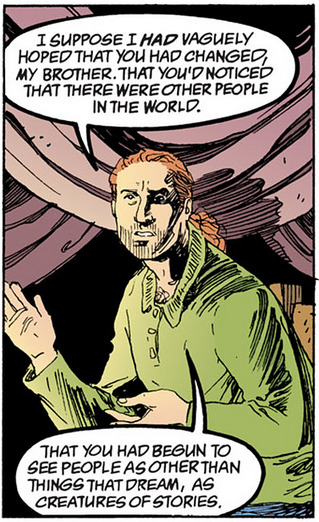
so giving him that name is directly dream going "this is the end of the story. you come back and then we forgive you for leaving"
and that's really one of the most succinct ways of explaining why nothing destruction was saying really got through to dream - for all his talk about respecting his brother's wishes, dream is just waiting to be proved right
#and then of course that really doesn't happen for multiple reasons but you know!#sandman comic spoilers#the sandman#dream of the endless#destruction of the endless#meta#mine
150 notes
·
View notes
Text
Now that I have some feedback on this year's Inklings Challenge themes, a few suggestions seemed the most popular.
Several voices expressed interest in Gifts/Fruits of the Spirit, which continues to intrigue me, but I shy away from it for the same reason that I have other years, which is that Love, Joy, Peace, Patience, Kindness, Gentleness, and Self-Control mostly fit fairly closely in with one another, which would make it difficult to single out one as a focus, and could make for stories that fit within a very narrow band.
One possibility that occurs is to make a list of lists: seven themes that are all groupings of their own, though this makes it even more complicated.
However, now that I’m thinking of those lists, I suddenly have a bunch of other ideas.
If this was a strictly Catholic challenge, we would totally be doing sacraments for the theme list.
The Corporal Works of Mercy are also probably mostly a Catholic concept, but they offer very specific yet wide-ranging prompts for stories.
Feed the hungry
Give drink to the thirsty
Shelter the homeless
Clothe the naked
Visit the sick
Visit the imprisoned
Bury the dead
If I’m willing to expand the list just slightly, we could do the Eight Beatitudes, which also offer very specific story-related prompts.
Blessed are the poor in spirit: for theirs is the kingdom of heaven.
Blessed are the meek, for they shall inherit the earth.
Blessed are they who mourn, for they shall be comforted.
Blessed are they that hunger and thirst for justice, for they shall have their fill.
Blessed are the merciful, for they shall obtain mercy.
Blessed are the pure of heart, for they shall see God.
Blessed are the peacemakers, for they shall be called the children of God.
Blessed are they that suffer persecution for the sake of Christ, for theirs is the kingdom of heaven.
There was also a lot of interest in letting people pick books of the Bible as inspiration, leaving it up to the author to choose whether to be inspired by plot points, themes, characters, etc.
If I did go with this option, I’d probably do a combination of specific books + categories to cover a wider range. Something like
Genesis
Judges
Kings
Prophets
Psalms
Gospels
Revelation
I do like this idea, but this does leave a burden on the author to dive into the Bible, and with only a three-week writing window, people could get too tangled up in possibilities or the time commitment of rereading to actually write anything in time (and it could suggest we’re expecting retellings, which would not be the case.)
Other Bible-related options that intrigue me included the suggestion to list seven Bible characters to use as inspiration—which could have the same effect of making people think we’re expected retellings instead of just “use this as a spark of inspiration”. One way to avoid that could be to list several categories of characters and let people pick: Fathers, Judges, Kings, Prophets, Apostles, etc. But then we get back to the “requires too much research on the author’s part” problem.
I also loved the idea of using seven of Christ’s parables as prompts. This has a similar benefit to the “books of the Bible” option in that it would allow people to choose plot points, characters, themes, imagery, etc., but it narrows the focus so there’s not so much reading to dive into. It also has a similar drawback—people might think we expect retellings. But in our Christian storytelling challenge, it seems very fitting to tie our work to the idea of Christ as storyteller.
List of possible parables include the well-known story parables:
The Good Samartian
The Prodigal Son
The Ten Virgins
The Unforgiving Servant
The Rich Man and Lazarus
The Pharisee and the Tax Collector
The Laborers in the Vineyard
The Ten Talents
As well as some with more abstract imagery:
The Parable of the Sower
The Parable of the Wheat Among Weeds
The Parable of the Lost Sheep
The Parable of the Pearl
The Parable of the Barren Fig Tree
The Parable of the Mustard Seed
The Parable of the Friend at Midnight
I understand I have not made my problem easier. I’m just trying to list some options and get more specific feedback.
38 notes
·
View notes